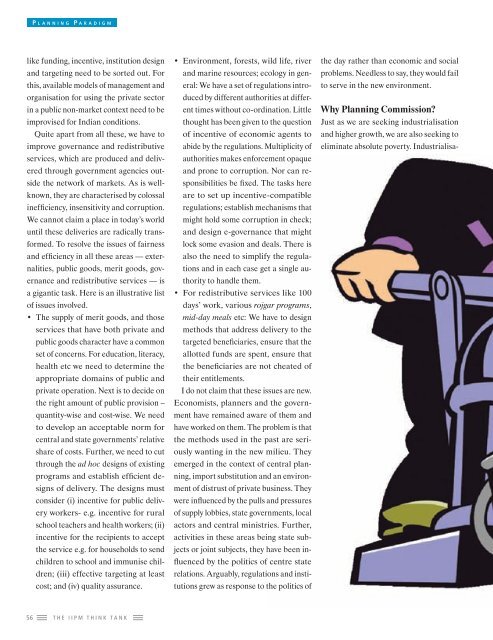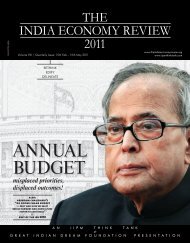Download - The India Economy Review
Download - The India Economy Review
Download - The India Economy Review
Create successful ePaper yourself
Turn your PDF publications into a flip-book with our unique Google optimized e-Paper software.
P LANNING P ARADIGM<br />
like funding, incentive, institution design<br />
and targeting need to be sorted out. For<br />
this, available models of management and<br />
organisation for using the private sector<br />
in a public non-market context need to be<br />
improvised for <strong>India</strong>n conditions.<br />
Quite apart from all these, we have to<br />
improve governance and redistributive<br />
services, which are produced and delivered<br />
through government agencies outside<br />
the network of markets. As is wellknown,<br />
they are characterised by colossal<br />
ineffi ciency, insensitivity and corruption.<br />
We cannot claim a place in today’s world<br />
until these deliveries are radically transformed.<br />
To resolve the issues of fairness<br />
and effi ciency in all these areas — externalities,<br />
public goods, merit goods, governance<br />
and redistributive services — is<br />
a gigantic task. Here is an illustrative list<br />
of issues involved.<br />
• <strong>The</strong> supply of merit goods, and those<br />
services that have both private and<br />
public goods character have a common<br />
set of concerns. For education, literacy,<br />
health etc we need to determine the<br />
appropriate domains of public and<br />
private operation. Next is to decide on<br />
the right amount of public provision –<br />
quantity-wise and cost-wise. We need<br />
to develop an acceptable norm for<br />
central and state governments’ relative<br />
share of costs. Further, we need to cut<br />
through the ad hoc designs of existing<br />
programs and establish effi cient designs<br />
of delivery. <strong>The</strong> designs must<br />
consider (i) incentive for public delivery<br />
workers- e.g. incentive for rural<br />
school teachers and health workers; (ii)<br />
incentive for the recipients to accept<br />
the service e.g. for households to send<br />
children to school and immunise children;<br />
(iii) effective targeting at least<br />
cost; and (iv) quality assurance.<br />
56 THE IIPM THINK TANK<br />
• Environment, forests, wild life, river<br />
and marine resources; ecology in general:<br />
We have a set of regulations introduced<br />
by different authorities at different<br />
times without co-ordination. Little<br />
thought has been given to the question<br />
of incentive of economic agents to<br />
abide by the regulations. Multiplicity of<br />
authorities makes enforcement ement opaque<br />
and prone to corruption. . Nor can responsibilities<br />
be fi xed. <strong>The</strong> he tasks here<br />
are to set up incentive-compatible<br />
-compatible<br />
regulations; establish mechanisms chanisms that<br />
might hold some corruption tion in check;<br />
and design e-governance ce that might<br />
lock some evasion and deals. eals. <strong>The</strong>re is<br />
also the need to simplify y the regulations<br />
and in each case get et a single authority<br />
to handle them.<br />
• For redistributive services ices like 100<br />
days’ work, various rojgar gar programs,<br />
mid-day meals etc: We have ave to design<br />
methods that address delivery elivery to the<br />
targeted benefi ciaries, ensure nsure that the<br />
allotted funds are spent, , ensure that<br />
the benefi ciaries are not ot cheated of<br />
their entitlements.<br />
I do not claim that these issues ssues are new.<br />
Economists, planners and d the government<br />
have remained aware of them and<br />
have worked on them. <strong>The</strong> problem roblem is that<br />
the methods used in the past are seriously<br />
wanting in the new milieu. <strong>The</strong>y<br />
emerged in the context of central planning,<br />
import substitution and d an environment<br />
of distrust of private business. usiness. <strong>The</strong>y<br />
were infl uenced by the pulls and pressures<br />
of supply lobbies, state governments, rnments, local<br />
actors and central ministries. ries. Further,<br />
activities in these areas being ing state subjects<br />
or joint subjects, they have been infl<br />
uenced by the politics of f centre state<br />
relations. Arguably, regulations ons and institutions<br />
grew as response to the politics of<br />
the day rather than economic and social<br />
problems. Needless to say, they would fail<br />
to serve in the new environment.<br />
Why Planning Commission?<br />
Just as we are seeking industrialisation<br />
and higher growth, we are also seeking to<br />
eliminate absolute poverty. Industrialisa





